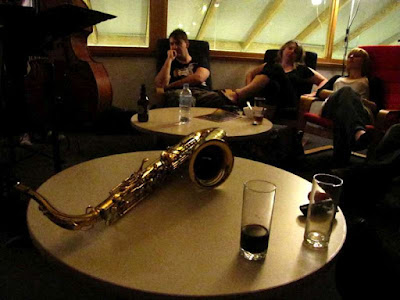I was chatting with trumpet Tom after the gig and I commented on how complex and difficult was this music and he suggested it had taken them 3 years to master it. That floored me. The recording makes it seem demanding but fairly relaxed. The tour and this gig just opened the complexity and difficulty for all to see. So it was not music for the faint-hearted in the audience let alone in the band but the skills and chops and cleverness and commitment were skyhigh and that was evident. I think the compositions are by pianist and leader Wilbur, presumably with input over those years from the others. Certainly, he talked on the ABCRN Music Show of tunes that had welcomed a floating intro and that would have been in the development stage. I sat in awe at every one of the players as they performed this complex, busy or airy, ever intellectual and demanding music. This was not an easy outing for band or audience. Early on, I tried to follow, count, investigate, understand but it was best and most satisfying when I just closed eyes and took it in. It was all complex in a musical sense, but evident enough in an emotional sense. Every instrument was virtuosic, often surprisingly generous and responsive to others, perhaps the alto and trumpets in synch or in competition or the piano defining the changes with that phat Moog bass or that immense sharpness from the kit or those lovely talkative interactions again between horns. And always the odd times, the dissonant and jumpy melodies. But also always the sharp and correct playing on something not at all easy. Not for the faint-hearted. Listen to the album and go to the gig and try to dissect it first up, perhaps, or just close your eyes and partake. Just don't expect an easy ride!
Wildfire played Smiths on their self-titled album-launch tour. Wildfire are Wilbur Whitta (piano, synth bass), Tom Avgenicos (trumpet), Jack Stoneham (alto), Alex Inman-Hislop (drums).






















